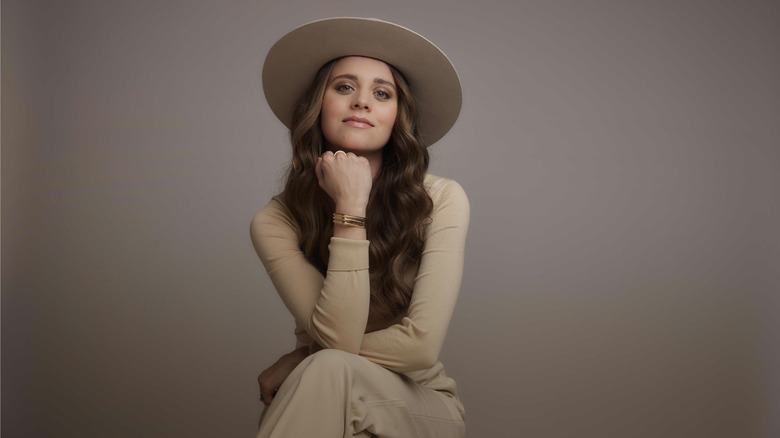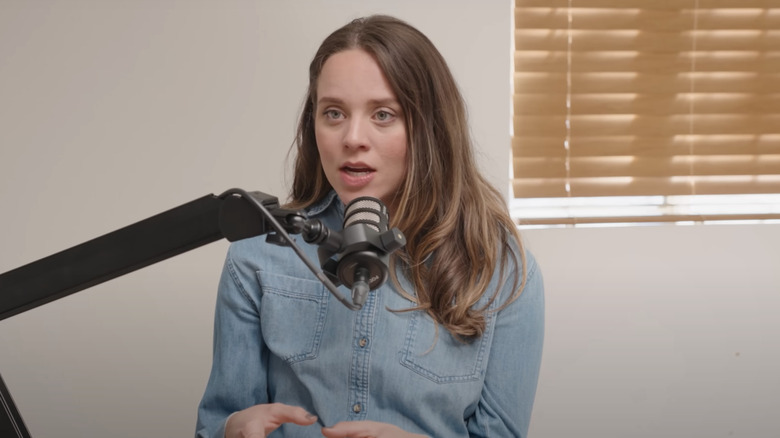Jinger Duggar-Vuolo's 'Rebel' Reputation Isn't What You Think — Exclusive Interview
We may receive a commission on purchases made from links.
Jinger Duggar has captivated fans for years as one of the stars of "19 Kids and Counting," but her journey since the cameras stopped rolling has been anything but predictable. The reality star-turned-author has been making waves with her candid exploration of personal growth and the challenges of navigating life after growing up in a restrictive religious environment. Her latest book, "People Pleaser," dives into the deeply ingrained need for approval she experienced in her younger years and the powerful journey of breaking free from that mindset.
But this isn't the first time Duggar has shared her story. Her previous book, "Becoming Free Indeed," delved into the errors of the teachings she grew up with and the struggles of stepping away from those systems. In "People Pleaser," she takes it a step further, reflecting on how those experiences shaped her identity and how she's redefined her sense of self while still maintaining love and respect for her family despite their major concern about reality TV shows.
Recently, Duggar returned to her Arkansas roots to celebrate a birthday, and in a candid interview, she opened up about how revisiting her past brings back memories—both sweet and challenging. "It's interesting how many memories come back... but I feel like I'm in such a healthier place now," the reality TV star shared, describing the personal growth that allows her to embrace family differences while staying true to herself. As she balances life as an author, podcast host, and mother of two (soon to be three!) after her surprise pregnancy announcement, Duggar continues to inspire others with her honesty, resilience, and faith as she dives into the complexities of family dynamics, people-pleasing tendencies, and how she has found her voice amid it all.
Jinger didn't shy away from the backlash to her first book
You recently traveled back home to Arkansas to celebrate a birthday. When you visit home, how do you honor your needs while navigating patterns of the past?
It is interesting. Anytime I step back into that world or even just going back to visit family, it's interesting because I've been so far removed from that location and even some of the traditions and things that people do and follow, I've been so far removed from it now. So when I go back into it, it's interesting how many memories come back, and a lot of the things that I remember will slip back into my mind at that point. But at the same time, I feel like with my family, we're in such a good place. It's taken years. You have to work through stuff.
We have so many differences still to this day, and yet I've been able to have a close relationship with most of my siblings, and it's been really sweet to see that because it's hard. It is hard when there are so many different opinions on everything. And I realize at the end of the day, we're not always going to agree on everything. And that's something that I've had to learn is okay, especially as a people pleaser, I want to keep everybody happy with me all the time. And it's something that I struggled with and so I feel like I'm in such a healthier place now, walking back into that setting where we have differences and we can just still come together and love each other. And it's been an interesting journey, but it's been a good one as well.
With such a big diverse family: What challenges have arisen with family members and your self-reflection and change? Conversely, have you inspired any loved ones to follow in your footsteps?
Yeah, when I first wrote my book "Becoming Free Indeed," it was talking about exposing the errors of the teaching I grew up under. And with that, I knew that there was going to be backlash. I knew that people in my community, my friends, my loved ones were going to react. Whether that was a good reaction or a bad reaction, I was bracing myself for it. And it was the hardest thing to do, was to write that book, but I knew that I had to. And when I was able to break free from that bondage to people pleasing, realizing I've got to speak because no one else is saying anything about this and it's very harmful.
Once I did that and got to that place in my own heart where I felt like I can speak what I know is true and what is right, then that gave me such freedom to look at everybody around me and say, okay, this is a loved one. This is somebody I care so deeply about and maybe they're going to reject me at the end of the day because of it. That was a hard realization I had to work through before releasing the book. And then at the end of the day, I was like, I'm just going to trust God that he is going to work this out and whatever happens, I'm just going to speak truth. And so thankfully, a lot of people who read the book were saying, "Oh wow, I'm actually surprised how maybe it was handled in a different way." I didn't want it to be a tell-all because I said, I'm going to share my story. This is about my story, this is not about my family. I stated that from the beginning because I wanted to be able to speak to those in the community and for them not to have a reaction. And so for them to react only to the teaching as being the issue. And so that was my main thing. I went to reach them, pull them out of this because it's so harmful.
And I'm so thankful to this day that a lot of relationships have actually been strengthened and people have been helped and come out of that, friends and family, and we've had so many long hours worth of conversations over it. And then there are also some who are still set in their ways and will follow those teachings. And I think that I just as personally, I can only do what I can do. And so if I can speak truth, it's not on me now. Once the truth is out there, it's on whoever is hearing it to take it, take what they will, and hopefully to be helped by it.
She learned to stop being silent and 'speak truth' no matter what
Reflecting on one's people-pleasing can unravel a mix of emotions, as you noted in your book. Have you ever experienced anger toward the system — or your parents — for fostering that people-pleasing environment? If so, how do you cope with that?
I think that looking back at my life, I can see the challenges. There were so many things that I've had to work through that will be lingering in my mind for years to come. There's a lot that you have to process and work through. And I think that in my mind, once I started to break down the system that I grew up under, the teachings, all of that, processing it, I saw, okay, I can see how people would get wrapped up in it. So for me, there are times where I'll be frustrated because I feel like, man, I could be so much further ahead or I could not be struggling with this right now if I wasn't raised in this system.
And at the same time, I also realized that I feel like so many families got wrapped up in it trying to protect their kids because they were promised a guarantee for success, and they were promised that this is going to protect your kids. This is going to set them up for being a light to the nations for helping others. And so a lot of parents took that guarantee and they said, "Wow, this is amazing. We're going to devote our lives to it." And I think that for me to look at it now, stepping back, I see, okay, they were well-meaning when they went into it. And so it gives me a little bit of a barrier of like, okay, I don't want to become angry and bitter because that's not going to help me either. It's just going to put me in a worse place, but I want to learn from, okay, it's unfortunate that I was in this circumstance, but I want to move forward today to grow, to be a better person and to come out of these teachings.
And so as far as people pleasing goes in that, I feel like the easy thing to do in that setting is to just be silent. That's kind of what we were told. Just be agreeable, everybody, just don't talk about any issues. Always be happy, always be cheerful. And I think that for so many years I lived as a people pleaser in that way. I saw myself as the person who had to just constantly keep everybody happy and at bay. But then when you do ruffle feathers, it makes you really realize, okay, what am I coming to this relationship for? Is it to be totally satisfied from that person and from like, I need you. I'm so desperate because desperate is not a good look when you're a people pleaser. You're just like, I need this relationship. Maybe you're famous, maybe you have money, maybe you have some sort of thing that I feel like I need in my life. And so instead, turning it around and saying, "okay, well where is this person?" How can I help them? How can I serve them? And even when it comes to speaking truth, that's a way of serving people even if they don't acknowledge it and they may not receive it. I have to be willing to speak truth even if there are critics.
Jinger is on full alert making sure her daughters aren't people pleasers
What has been the most special or healing aspect of raising your daughters to avoid people-pleasing?
It's been interesting. With my girls, they're six and four, so they're very young. The four-year-old just loves to play cars and trucks. That's her thing. She's just obsessed with them. So she's kind of not really in that world of thinking too much about people pleasing yet. But my six-year-old is in school and she is constantly coming home talking about things that have happened or a circumstance, something came up. And like the other week she was talking about Mom, "I see all the kids at school have Converse and I just don't have those. I feel like I need them." And I told her, I said, "Well, you have so many pairs of really cool sneakers. We need to be content with what we have." And she's like, "Well, I don't know if my outfit is nice enough on free dress day, so maybe I should pick out something nicer."
And I think that starts at such an early age. And so whenever these conversations come up organically, I kind of let her bring it up because I'm realizing more and more, wow, I couldn't remember when the people pleasing tendencies exactly started in my own life, but I want to be able to walk her through it and say, I don't want you seeking for approval from all these people and your friends because there will be people who are very unkind to you and that does not determine who you are. You don't need to live or die based on their criticism. And so for that, for her, even at the age of six, we've had so many conversations. She's a deep thinker and she likes to talk through everything. And it's helpful for, whenever these come up, I just try to take the time to stop and walk her through it and say, "Well, that's really awesome. It's a good thing to be liked, to want to be liked by others. We are designed for community. That's good. So if you want to have a pair of Converse, there's nothing wrong with that.
But we also need to realize that we are not going to place our identity in that object and in that friendship. But you are beautifully designed how God wanted you to be. You are strong, you're a beautiful young girl. Your friends love you. You have fun personality," like focusing on other things instead of just that drive to need to have everybody approve and need to have the same thing as them. So I feel like we're just starting to navigate that with them, but we just want to keep the conversation flowing organically.
How Jinger flipped the script on her haters
Fans have often misjudged you throughout your journey in the spotlight. Has a fan ever reached out to you to share they were wrong about you or are inspired by your personal growth?
Yes, there have been quite a few comments actually, and emails, stories that people have shared. And I think that for so many years I was kind of labeled as this rebel. People thought I was going to run away to the big city. That's all I want to do when I was 14. They were like, surely that's all she wants to do and they kind of created a character of me. And that was something that I think it's easy to do with anybody on social media nowadays or just on a reality show because it creates that where you're just viewing their life. Oh, she rolls her eyes whenever something's said or whatever. So they had created that.
And it was interesting because a lot of people kind of jumped behind that as who I was. And ultimately I was actually very happy in the system I was raised in. I was super content to stay there. I was probably one of the most biggest rule followers in that system. And so whenever you step outside of it, and I think the fans can only see so much of your life that you share or that is shared for you on the show. And once I was starting to grow up and then start a podcast, talk about things that I'm actually interested in, then a lot of them came back and were like, "Oh, I'm so sorry. Maybe I said this harsh word to you at this time.
And now I see that wasn't true and that wasn't loving." But I think that when it comes to people pleasing, like I said a minute ago, I think that we can so easily lean in on what people say about us. We can just build our lives upon it. And it's like if we get so many likes or so many follows or so many comments, that's what's going to make our day. And that's who we are. Well, when that's taken away or when the show disappears, well then who are you? Is that going to make or break you, your job, your identity, your title? And at the end of the day, we can't let that be our confidence. We can't let that boost who we are because that's not our true identity. And I think that when critics say something, then if we are allowing those words to hit us like daggers and to destroy us, then we realize, okay, our focus has been in the wrong place. We haven't actually been doing any of this for others, to help others, to let them into our life. But it's been selfish and self-seeking and so realizing we need to turn that around. What positive light can I bring to somebody today? What truth can I share that would be helpful for them and thinking that way instead of, what can I get from you?
And I think that has changed the game for me when it comes to critics. I'm not going to hang on their every word. For the positive things, I want to take that because it's helpful whenever you get helpful feedback or an encouraging word. We all need that as humans. And at the same time, that's not all we can live by. We need to be who we are, confident in who we are and realize that we were designed by God for a reason and we need to be able to share that light with others and share hope with them.
Jinger's book, "People Pleaser: Breaking Free from the Burden of Imaginary Expectations," is available for purchase as of January 14.




